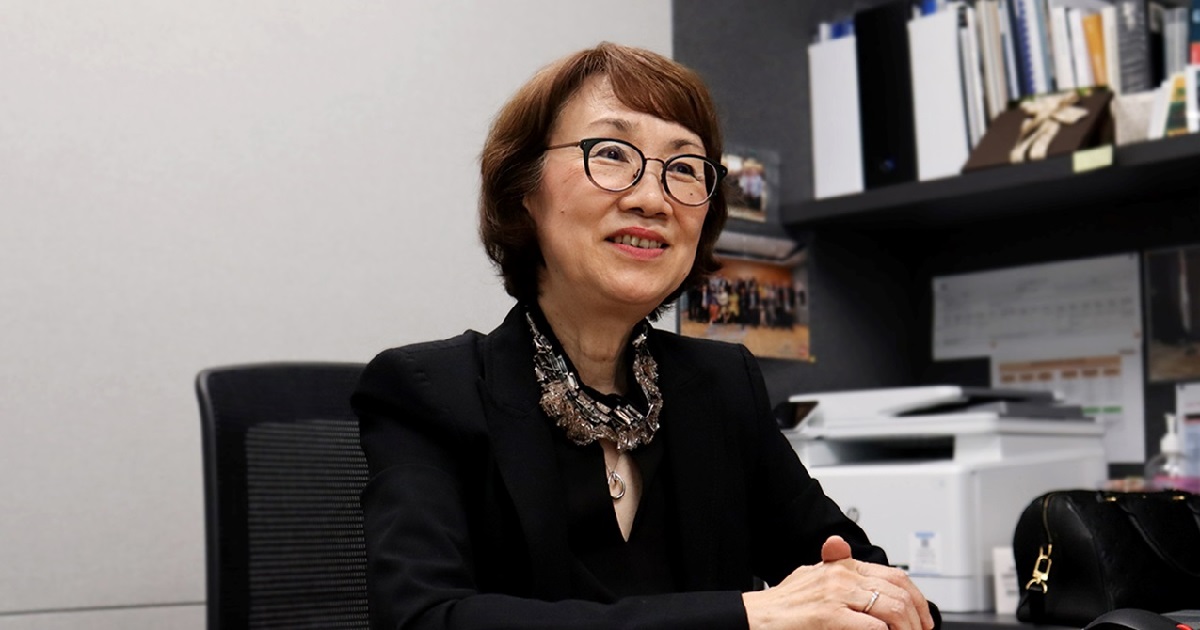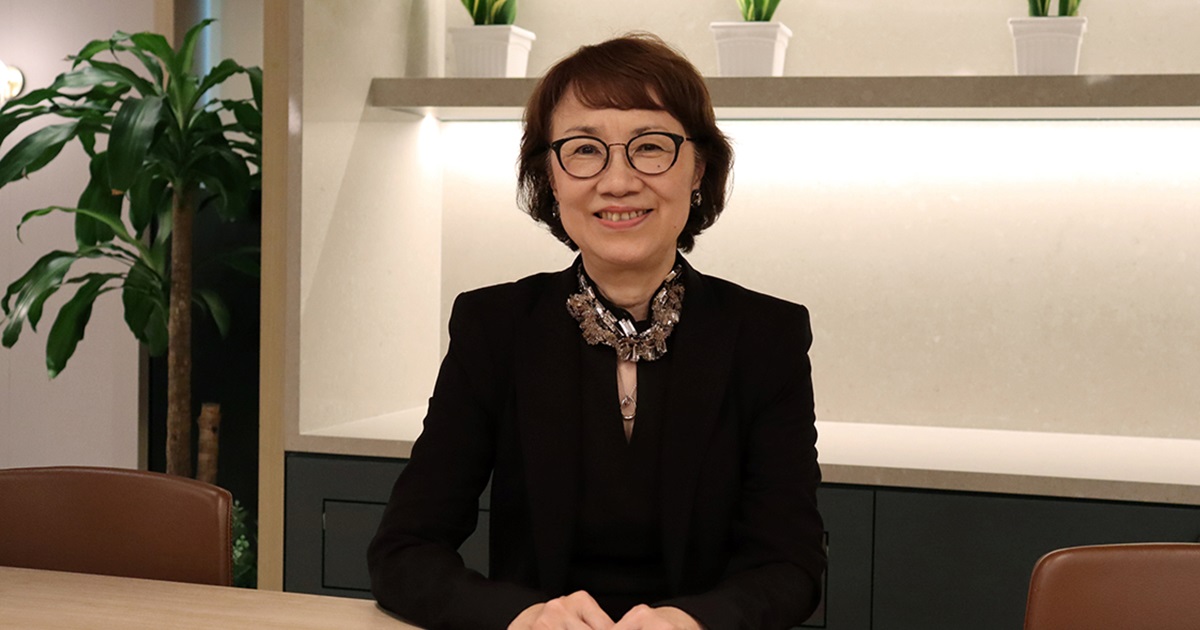Keep Growing Conversations: "No Venture. No Gain."
Keep Growing – this is our clarion call within and beyond Enterprise Singapore.
It’s about breaking out of our comfort zones, challenging the status quo and continuously learning to become better versions of ourselves.
In this instalment of our Keep Growing Conversations series, we speak to Choy Sauw Kook, Director-General for the Quality & Excellence Group. Under this portfolio, Sauw Kook seeks to drive Singapore towards becoming an internationally recognised standards developer, especially in novel and emerging areas such as artificial intelligence and sustainability. Sauw Kook was also recently elected as a member of the ISO Council, where she collaborates with the global community to showcase the importance of Standards.

Hi Sauw Kook, have you always been in the public service? Please tell us more about your career journey.
I started my working life in the private sector as a civil engineer at a private consultancy firm. Back then, the firm was involved in some key infrastructure projects such as the aircraft hangars located within Changi Airport.
After two years, I decided to broaden my horizons and try something different and was presented with the opportunity to take on a new role at the National Productivity Board (NPB) to build Singapore’s training infrastructure under the Skills Development Fund team. NPB wanted someone with private sector experience, and I thought to myself – why not? My motto in life has always been “No Venture. No Gain”, so I figured why not try something new? This decision marked the start of my 36 years within the public sector.
Shortly after, the Productivity and Standards Board (PSB) was formed through the merger of NPB with the Singapore Institute of Standards and Industrial Research. At PSB, I decided to expand beyond skills development to focus on broad-based SME development. I had the opportunity to be posted to the Economic Development Board, where amongst others, I worked alongside Minister Josephine Teo, who was then heading the services unit. We looked at two main SME schemes, one of which is the Enterprise Financing Scheme, which still exists today!
That’s quite a journey. Can you share how you came around to your current portfolio as Director-General for the Quality & Excellence Group in Enterprise Singapore?
In the early 2000s, Singapore shifted towards being an innovation-driven economy, and PSB was renamed SPRING Singapore. At SPRING, I embarked on technology innovation projects for SMEs, and even included a chapter on SMEs in the Science and Technology Plan 2010. SPRING then underwent further restructuring. Drawing on my years of experience in policy planning, skills training and capability development of SMEs, I was asked to consider the uplifting of SMEs by leveraging quality and standards (Q&S).
Once again, with “No venture. No gain” as my guide, I agreed.

Can you share why Quality and Standards (Q&S) is important for our businesses?
In layman terms, quality refers to how good or bad a product or service is compared against a certain standard. On the other hand, standards are the rules and guidelines that define good quality.
Standards are extremely beneficial to businesses as complying with them signals that their product or service consistently delivers good quality as they must undergo rigorous checks and testing processes. Attaining certifications to standards serve as tangible proof of the quality.
At EnterpriseSG, the Q&S group ensures that Singapore upholds a robust and internationally recognised Quality and Standards infrastructure. We ensure that our enterprises produce goods that meet high standards, are of good quality and in-tune with the market needs. Adopting and adhering to standards and conformance also ensures that our enterprises are constantly improving to stay competitive.
Congratulations on your recent election as an ISO council member. Can you share how your work is helping to spotlight Singapore on the international stage when it comes to Standards?
Standards aren’t just rules for companies to follow. They serve as a common language.
To this end, Singapore is a member of key international standard and conformance fora such as the International Organisation for Standardisation, International Electrotechnical Commission, International Laboratory Accreditation Cooperation, International Accreditation Forum and the Association of Southeast Asian Nations Consultative Committee for Standards and Quality.
Being part of the ISO Council representing Singapore alongside other major countries places us prominently on the world stage. It is both an honour and a privilege. In this role, we stay informed about the latest developments and actively contribute Singapore’s perspectives to global discussions. Additionally, we benefit from insights shared by leading nations, adapting their approaches to our local context for mutual advancement.
As Singapore advances in various emerging growth areas such as sustainability, AI and deep tech, it allows us to develop standards that are not only useful, but internationally recognised. It also creates business opportunities, allowing our local businesses to enter global markets.
What were some of the tougher challenges you faced in your career and how did you overcome them?
Throughout my career, I’ve encountered hurdles on both local and international fronts.
Locally, I’ve navigated several economic challenges, spanning from the Asian Financial Crisis in the late 1990s to the SARS outbreak in the 2000s and more recently, COVID-19. While each posed significant disruptions, the Global Financial Crisis of 2008, where Singapore fell into a recession stands out the most to me.
I was with SPRING Singapore then and the main challenge we faced was credit crunch. Many banks were hoarding their cash and refusing loans to local enterprises in view of the Lehman Brothers bankruptcy.
To solve this issue, one new idea we came up with was to create a Bridging Loan Scheme to help our enterprises access working capital. We had to convince banks to collaborate with us while encouraging enterprises to participate, and at the same time set aside risk mitigation measures. Despite all the difficulties, we managed to push the scheme and other measures out in just four weeks. This experience taught me the importance of perseverance, especially when navigating new and unexpected challenges.
On the international stage, my election to the ISO Council last year stands out as a defining moment. The competition was fierce, with worthy contenders from around the world vying for limited seats. Given the odds, it was a challenging decision for me to step forward and run for the elections, but I believed strongly in the positive impact of Singapore’s representation on the ISO Council. But I was motivated by the support of my top management, my own team and even other agencies. So drawing on my background as a former ISO Vice-President for Technical Management, we engaged a multitude of international stakeholders, campaigning for them to vote for Singapore. This experience was both humbling and enriching.

You certainly embody a growth mindset. What is your advice on how we can keep growing?
The first advice I would share is that we should embrace and accept that change is not just inevitable, but essential for survival. Throughout our lives and careers, we will face speed bumps and roadblocks along the way. Don’t be discouraged and don’t give up. While it may unsettle you momentarily, the key is to look at them as opportunities, rather than obstacles.
It’s also important to be constantly learning. Stay open to new ideas, innovation and experiences.
Given your busy schedule, how do you unwind and recharge?
I unwind by doing simple things that makes me happy. Like many of us, I like to catch up on my hobbies and spend time with my family.
One hobby I enjoy is watching Korean dramas and variety shows, especially after a long day at work. It’s nice to laugh it out sometimes and I treat such moments as my me time.
I also enjoy spending my weekend routine at the wet market, catching up with different stall owners. It’s not just about buying from them, but also checking on their well-being as many of them have become friends over time.


